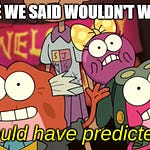I love the ongoing conversations about the influence of org ecosystems on individuals, and here’s a great meta-analysis on workplace deviance — behaviors that violate org norms and that range from gossip to verbal/physical assault (interpersonal deviance) to full-on theft or espionage (organizational deviance). The link above is for the full study, which provides a great summary of the deviance literature.
A related study we’ll discuss today is linked here, and the summary is in MIT Sloan’s latest issue. Let’s talk about what the researchers learned about some invisible dynamics in workplace deviance.
(Deviance is a really strong word, no? Keep in mind that the researchers just mean behaviors that violate contextually-situated norms in some fashion; we’re not talking about capital murder here, necessarily, though some deviance behavior can be severe — embezzlement, for example.)
These researchers uncover the idea that ecosystem influences individual behavior in the context of org deviance, specifically the effects of leadership. The effect of leadership is under-theorized in studies of workplace deviance, but their analysis indicates that such deviance isn’t a matter of a few bad apples, typically, but is often rather — at least in part — the product of dirty water in the form of poor leadership.
Personal correlates to deviance are weak: In other words, there’s no personal trait or quality that directly links up with the propensity for both interpersonal and organizational deviance. What DOES link up, however, is dirty water: Perceptions of negative treatment from coworkers, specifically abusive supervision.
The researchers say that leaders are not often held accountable for deviance in the workplace; they call it an “unwritten rule” that protects leaders and that writes off such behavior as unavoidable given the wide continuum of individual human traits and characteristics in any organization.
But guess what? As leader behavior becomes more destructive and abusive (lying, reminding subordinates of failure, putting people down in front of others, etc.), even GOOD EMPLOYEES demonstrate a decrease in positive organizational behaviors.
They may not become corporate espionage artists, but they certainly might quiet quit and might cease their typical above and beyond behaviors (I saw a better term for this phenomenon: Calibrated contributing).
This research reminds me a lot of the work I read many years ago about students in high schools: Good students in lower-performing high schools (read that as “lower funded” because that’s what it is, and it’s a choice we have made) perform worse than poorer students in high-performing high schools. The environment matters.
An image I conjure up routinely is one of a pond: If the fish aren’t healthy or swimming in the right direction, it’s almost never because they choose it. They are adaptive and reactive to the environment, and evidence suggests that humans in orgs are that way, too.
So what should people do? Leaders of humans in any org setting (a whole org, a department, a class, a cub scout troop, a swim team, a family…literally anything that meets the criteria of an org) should reflect on the role they might play in the dynamic.
First, we’ll want to re-frame individual behaviors and consider them less as products of individual traits, characteristics, and tendencies and more as products of an environment: Not all bad behavior is because someone is “a bad apple.”
(Honestly, I find myself stunned by the laziness of that “bad apple” logic, but I digress.)
Second, we’ll want to reflect on what the authors call a flash point. Did something specific prompt this behavior? Or have we seen some ongoing degradation of relationships in the organization (this one is always my first hypothesis, to be honest)? Do people feel respected? Heard? Perception matters here because perception is, in fact, reality.
And finally, I want to let people off the hook, too. I think people might sometimes see things in themselves they don’t like and wonder what’s wrong with them.
Why am I feeling a lack of motivation? Why do I feel like I can’t be the “above and beyond” person I once was? Why do I feel resentful or avoidant of activities that are outside of my scope, things that maybe I would have once tackled? What is wrong with me?
Quasi-post-pandemic life could be partly to blame, of course, but so can a sentiment I’ve heard many times before from members of my family who work on the shop floor:
Whenever you’re wondering if you’re the problem, first look around and make sure you aren’t surrounded by a-holes.
Re-framing org member behaviors as potential products of leader behavior is a useful tool for expanding our understanding of the dynamics that unfold in any org environment.1
Here’s one of the most challenging parts of consulting: We can link so many problems in under-performing orgs to leadership choices that I almost can’t even engage in conversations about that anymore. How do you tell the people who are paying you that they’re the problem? Consultants, be very careful about the contracts you accept!














Do Apples Spoil Due to Poor Leadership?